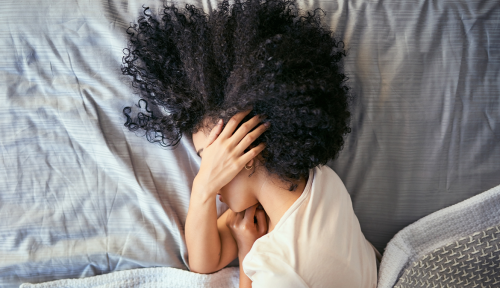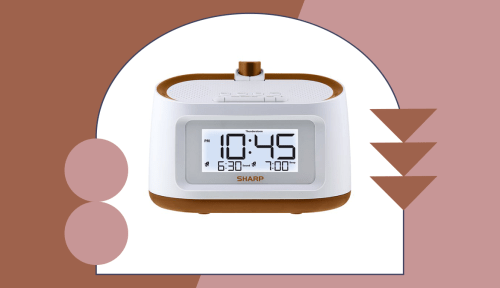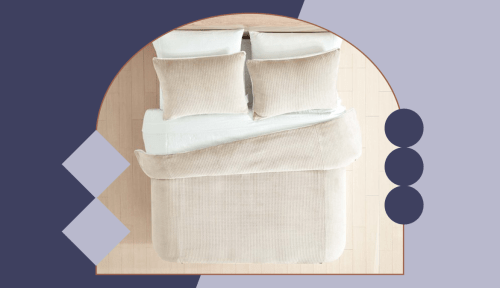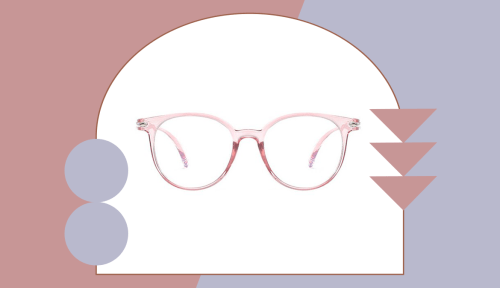advertisement
3 Reasons You Might Be Having Trouble Sleeping (Even if You’ve Tried *Everything*), According to a Sleep Doctor
Trouble sleeping? Sleep psychologist Dr. Joshua Tal shares tips on aligning your circadian rhythm with your personal sleep hygiene, and more.

When you have trouble sleeping, you might be tempted to try anything and everything to punch your ticket to snooze town: counting sheep, taking cold showers, meditating, etc.
And while you might hear from people on social media who swear by those quick-fix solutions, sleep and health psychologist Dr. Joshua Tal, PhD, says that if your goal this new year is to sleep well, the best way to start is by examining your overall sleep hygiene.
“Sleep hygiene is trying your best to take steps to protect your sleep experience,” Dr. Tal says. “But each person is different and has different things affecting sleep.” To approach your unique sleep situation, he recommends following a two-step process: try to determine the root cause of your sleep struggles, and then remedy it within the scope of your own abilities.
But, what exactly are some reasons you might be having trouble sleeping? Here, Dr. Tal shares expert insights on the some of the most common causes for difficulty sleeping, along with some tips, tricks, and product recommendations (all of which you can snag from Walmart, the one-stop shop for a huge selection of wellness-supporting products) to help remedy them—so you don’t have to keep relying on counting sheep in 2022.
Keep reading for reasons why you might be having trouble sleeping, and the tools that can promote better sleep hygiene.
1. Disrupting your circadian rhythm
Raise your hand if you often stay up late on weeknights (and rise early the next day), to then try to make up those lost hours on the weekend. You’re not alone, but sleeping extra on the weekends might be messing with your circadian rhythm.
The body’s natural sleep-wake cycle can get thrown off-kilter when you switch up your sleep schedule too much, and Dr. Tal notes that this disruption can manifest as social jet lag—when a person experiences difficulty falling asleep from Sunday through Tuesday because they slept so much over the weekend, which can perpetuate the sleepless cycle.
To avoid that, Dr. Tal recommends waking up at the same time throughout the week and the weekend, which will make an alarm clock (no, not your phone) your new favorite sleep sidekick. You can add melatonin gummies to your bedtime routine to help jumpstart your sleep cycle back into its proper rhythm, and Dr. Tal also recommends keeping a lavender-scented aromatherapy spray near your bed to help your mind relax for slumber.

Sharp Projection Alarm Clock with Soothing Nature Sounds — $20.00

Natrol Strawberry Melatonin Gummies — $13.00

Aura Cacia Aromatherapy Mist — $7.00
2. Putting pressure around good rest
“Nowadays, I feel like we are in a bizarre place with sleep,” Dr. Tal says. “Western society used to devalue sleep (‘you’ll sleep when you’re dead,’ etc.). Now, many studies have come out telling us the importance of sleep, and this pushed the needle in the other direction. Many people now over-prioritize sleep, causing excessive pressure to sleep…thus increasing sleep struggles.”
To take the pressure off, Dr. Tal reminds people that it’s okay if you don’t sleep wellall of the time—your body is resilient enough to handle a few not-so-great nights.
“As long as you are prioritizing sleep and giving yourself enough time to sleep, you are doing a great job,” he says. One of the best ways you can prioritize your sleep? By creating a bedroom environment that supports it. Think: comfy sheets, a wildly cozy sherpa waffle comforter set, amber-tinted light bulbs, and using blue light blocking glasses when looking at screens in the evenings.

Gap Home Organic Cotton Washed Chambray Sheet Set — $60.00

KOZE Jacob Sherpa Waffle Flannel Comforter Set — $90.00

Great Value Amber Light Bulb — $6.00

Musa Wanna Blue Light Blocking Glasses — $18.00
3. Underlying sleep health concerns
Whether you’re having issues sleeping deeply or staying asleep throughout the night, it could point to a bigger health concern, so you may want to consult with a medical professional to root out any sleep disorders that might be undiagnosed. Dr. Tal shares that sleep apnea is 85 percent undiagnosed in the general population, and 93 percent undiagnosed in women. “There are many online companies that will do a comprehensive home sleep study from the comfort of your bed,” he says.
And whether your sleep concerns fall under that category or not, Dr. Tal adds that it’s helpful to engage in an activity when you have trouble sleeping. Make yourself comfortable with some stylish throw pillows, then use a mindful tool like a crossword or jigsaw puzzle, which Dr. Tal says can help you stop fixating on the fact that you can’t sleep. And a calmer mind will always fall asleep faster—the doctor says so.

Decorative Throw Pillow Cover, Semi Circle Geometric Pattern — $8.00

Puzzle Crazy Crossword Puzzle — $12.00

JigFun Color Explosion Jigsaw Puzzle — $35.00
Want more wellness-boosting essentials and inspo? Check out the Walmart’s New Year Shop for everything you need to power your wellness goals this year.
Top photo: Getty Images/Layla Bird
Sign up for the Well+Good SHOP Newsletter
Get exclusive deals on wellness, beauty, fitness, and food products that have been hand-picked by our editors.
Got it, you've been added to our email list.




